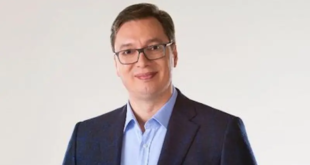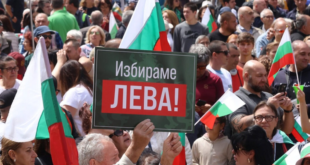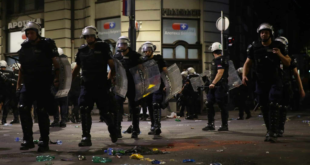 Former Bulgarian President Peter Stoyanov resigned as leader of the right-wing opposition Union of Democratic Forces (UDF) on Tuesday (May 22nd), two days after his party suffered a crushing defeat in Bulgaria’s first European Parliament (EP) elections. He was the second rightist leader to step down in as many days, after Ivan Kostov of the Democrats for Strong Bulgaria (DSB), whose party also failed to win any seats.
Former Bulgarian President Peter Stoyanov resigned as leader of the right-wing opposition Union of Democratic Forces (UDF) on Tuesday (May 22nd), two days after his party suffered a crushing defeat in Bulgaria’s first European Parliament (EP) elections. He was the second rightist leader to step down in as many days, after Ivan Kostov of the Democrats for Strong Bulgaria (DSB), whose party also failed to win any seats.
“UDF needs a change, UDF can go on without me,” Stoyanov, who served as Bulgarian president from 1997 to 2002, told reporters as he announced his resignation. He said his stepping down is “the only way forward”, and he called for right-wing parties to unite.
UDF was created as an umbrella movement by a number of parties and organisations less than a month after the fall of communism in late 1989. It was transformed into Bulgaria’s main anti-communist party in the mid-1990s, with Kostov as its leader. He was appointed prime minister in 1997, after a UDF-led coalition won snap parliamentary elections in April that year, triggered by a political crisis and street protests against the Bulgarian Socialist Party’s (BSP) government.
Kostov served a full four-year term as prime minister, but following his party’s defeat in the 2001 parliamentary elections, he withdrew from active politics.
Following a period of political discord and clashes over policy issues, a splinter group, headed by Kostov, left the UDF to eventually set up the conservative DSB in May 2004.
Both faired poorly in the 2005 parliamentary elections that produced the current BSP-led ruling coalition, including also the National Movement for Simeon II (NMSII) and the Movement for Rights and Freedoms (MRF).
Last year, candidates — supported either jointly or separately by the UDF and DSB — were defeated in the first rounds of both the snap mayoral vote in Sofia, as well as in the November presidential election.
“It was our mistake that we [DSB] did not try to convince UDF to continue working together [with us] after last year’s presidential elections,” Kostov said.
In Bulgaria’s first EP elections on May 20th, the UDF and the DSB won 4.7% and 4.3% of the vote respectively, well below the 5.6% threshold required to win a seat in the EU legislature.
Last week, Kostov announced his, and the entire DSB leadership’s, resignation. Hours before Stoyanov followed suit, he said their two parties should unite as a possible way out of the crisis both are facing and to garner greater voter support in local elections this fall. A DSB-UDF coalition — or outright merging of the two parties — could offer rightist voters another choice.
“It is clear that voters are rejecting this separation between UDF and DSB,” Kostov, who will stay in his post until a party conference in mid-September, said in an interview with Bulgarian National Television. “The future of the relationship between the two should be the subject of a serious debate,” he added.
Also the source of serious consideration is GERB, the new centre-right opposition party that narrowly won the EP vote.
Kostov is a chief critic of GERB’s informal leader, Sofia Mayor Boyko Borissov — Bulgaria’s most popular politician, who previously served as the Interior Ministry’s top crime fighter. Kostov refuses to recognise him as a true right-wing politician.
The fact that GERB failed to outline its programme and platform since it was officially founded in December has also invited criticism from politicians on both sides of the political spectrum, with many describing it as populist.
Nevertheless, Borissov’s party snatched a surprise victory, grabbing 21.7% of the vote and five of the 18 EP seats allotted to Bulgaria. Its deputies are expected to join the European People’s Party (EPP-ED), the largest and most influential political group in the 785-seat EU legislature, bringing its total number of MEPs to 278.
An outspoken critic of Bulgaria’s ruling three-party coalition, Borissov said after the vote that he would push for early parliamentary elections to be held alongside local elections in autumn. He has signalled his readiness for future co-operation with the UDF and the DSB.
Held amid an ongoing high-level corruption scandal that has implicated the country’s chief investigator and energy and economy minister, Bulgaria’s first EP elections were marked by an extremely low voter turnout of 28.6%. Only four other parties besides GERB managed to pass the 5.6% threshold.
The BSP was a close second with 21.4% of the vote, entitling it to five MEP seats. The MRF, which represents Bulgaria’s ethnic Turks, came in third with 20.2% of the vote. It is expected to send four representatives to the Strasbourg-based EP. The NMSII, which came in second in the parliamentary elections two years ago, finished fifth with 6.3%, entitling it to one EP seat. The ultra nationalist Attack party can expect three seats after winning 14.2% of the vote.
Viewing the election results as largely in line with pollsters’ expectations, prominent Bulgarian political analyst Evgeniy Dainov said the biggest surprise for him was the fact that the socialists managed to lose a portion of their hard-core electorate.
He also appeared sceptical that unifying UDF and DSB would produce any positive effect unless all those serving in elective positions in the two parties, or representing them in local government bodies, resign first.
 Eurasia Press & News
Eurasia Press & News



